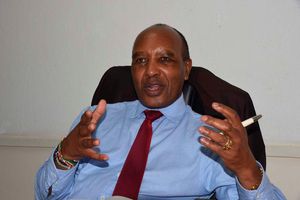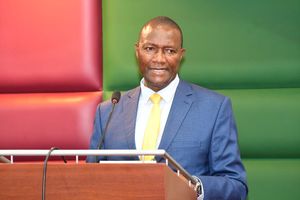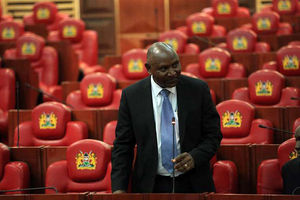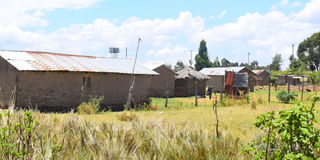
Turkana village in Nyandarua County on March 15, 2025. Despite intermarrying with the local Agikuyu community, the Turkana people of Nyandarua have fiercely guarded their traditions.
In their next world, Mzee Eskon Ereng and Ewoi Mrefu must marvel at the legacy of an initiative they started in Nyandarua County in 1963.
Yet, they would also regret the dire conditions of the village they pioneered over half a century ago, hundreds of kilometres from their ancestral home in Turkana County.
The two men arrived from Turkana in search of work eventually finding employment as herdsmen for a prominent farmer Robert Njogu who was among the few successful African landowners during the colonial era in Nyandarua area.
Attracted by the area’s cool climate, fertile lands and welcoming community, the two later brought their wives and a few other villagers to settle near Lake Olbolosatt.
Olbolosatt is the only fresh water lake in central Kenya and the source of water for Ewaso Nyiro River which serves communities in the arid counties of Laikipia, Isiolo, Samburu and parts of Garissa.
Despite intermarrying with the local Agikuyu community, the Turkana people of Nyandarua have fiercely guarded their traditions.
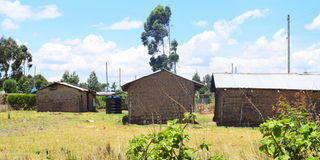
Turkana village in Nyandarua County on March 15, 2025. Despite intermarrying with the local Agikuyu community, the Turkana people of Nyandarua have fiercely guarded their traditions.
Their unique way of life passed down through generations remains intact even among those who have never set foot in Turkana County.
The community originally known for pastoralism, hunting and fishing found the shores of Lake Olbolosatt ideal for their way of life.
“At that time, the area was thickly forested and sparsely populated. We gathered wild fruits, hunted and fished. It was the perfect home. But now with deforestation and government restrictions on fishing, many of us rely on casual farm jobs to survive. Still, we hold onto our traditions which even our Kikuyu neighbours admire,” Selina Napomodea, an elder in the village says during an interview with Nation.Africa. For years, the Turkana in Nyandarua lived as squatters moving from one part of the lake to another.
However, their fortunes changed when former President Mwai Kibaki facilitated the purchase of 10 acres from a local farmer allowing 150 households to settle permanently.
But that number has now grown to over 500 households straining the limited land. Despite these struggles, the Turkana in Nyandarua continue to teach their children about their heritage.
Even young people like Grade 6 pupil Samuel Ekai are deeply knowledgeable about Turkana customs.
“Our clans are determined by our father’s age group. For example, my agemates and I belong to Ngimor while my father’s generation is Ngersai,” explains Ekai.
“One of my best moments is Asapan, our boys’ initiation ceremony when both the Turkana and Agikuyu communities celebrate together,” he goes on.
Peter Epua who was born and raised in Turkana Village says he considers Nyandarua County his home.
“We live peacefully with the locals. We have intermarried, we speak both languages and we celebrate traditions together. We are one larger community despite our different backgrounds,” says Epua.
However, beneath this integration lies deep-seated frustrations.
Many villagers feel abandoned by both county and national governments, particularly when it comes to employment opportunities. In fact in 2016, the Auditor-General put the county government on the spot over its ethnic composition.
In the 2013/14 report the then Auditor-General Edward Ouko said the county public service board failed to meet the 30 per cent constitutional threshold for employment of people from minority communities and favoured one group.
The report said only six out of the 202 employees were from minority communities during the period under review. In 2015, the Turkana community residing in the county stormed county governments in Ol Kalou town protesting discrimination in discrimination and the issuance of identity cards.
Epua says that despite having university and college graduates the community still faces discrimination in job placements.
“We have qualified youth but they are overlooked when government jobs are distributed. It’s like we don’t exist. It took protests for one youth from the village to be recruited into the police service,” he says.
Another resident, Michael Lomuiko, says their children are often denied opportunities simply because of their names.
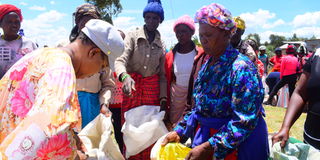
Nyandarua Woman Rep Faith Gitau distributes food at Turkana Village on March 15, 2025.
“When they apply for jobs, officials see their Turkana names and assume they are from Turkana County. But all our documents from birth certificates, ID cards, and academic certificates show Nyandarua as our home. Yet, when they go for recruitment in Turkana, they are turned away because they are not from there either,” he says.
With the rapid increase in population and limited land, residents in Turkana village face severe overcrowding.
Families share tiny plots often housing multiple generations in cramped spaces. The biggest challenge, however, is where to bury the dead.
“We live in the same compounds as our dead. There’s no cemetery so we bury our loved ones right next to our homes. It’s painful,” laments Ms Napomodea.
“In the same small compounds where we dig wells for drinking water, we also bury our dead. We are running out of space. The government should find us more land.”
With no land to farm most of them are relying on casual labour while others depend on relief food mainly from the Nyandarua Woman Representative’s office.
“My office cannot keep up with the growing population’s needs. They refuse food donations unless they are enough for the whole community. We need a lasting solution as a community cannot survive on relief aid in such a productive county,” says Woman Rep Faith Gitau.
The MP also singled out the urgent need for a cemetery and better land allocation.
“It’s traumatising to live among graves. The county has idle land that could be allocated to the community for farming. These people are hardworking and they just need land, seeds and farming inputs to sustain themselves,” she said.
Nyandarua Central Deputy County Commissioner Michael Ololtuaa acknowledged the community’s plight and promised action.
“We are working with leaders to ensure equal opportunities for everyone. The National Government Affirmative Action Fund through the Woman Rep’s office has pledged to address the village’s challenges,” the administrator told Nation.Africa.
Despite their hardships, the Turkana in Nyandarua say they have to remain resilient.

